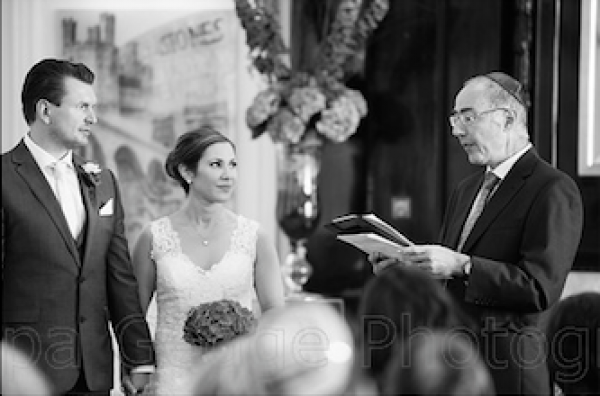
by Michael | Apr 25, 2022 | Blog
Just as there are many types of weddings, a mixed-faith service can vary ceremony by ceremony. Not just because the couples are different. Or because the religions highlighted might be different.
As with any celebrant-led ceremony, you can tailor the components to fit in with what you believe and want to include.
The ceremony can be 100% religious (or almost). I have conducted a couple of mixed-faith ceremonies, which were, to all intents and purposes, pretty much traditional Jewish wedding services (albeit with less Hebrew). In both cases, there was a Christian reading and/or prayer included. That’s how the couples wanted to play it out, and it worked.
In most cases, the couples want religious elements, despite not being active worshippers. In one case, it was simply to placate parents. Usually, it is because the couple, though not active participants, feel attached to their religion and want to include this as part of their important day.
There’s nothing to stop you mixing religious and pagan elements into one ceremony.
In all cases, the couples need to agree beforehand what they actually want. If they don’t, it’s a recipe for dis-harmony and potentially resentment. Of course, discussing things with the celebrant can clarify how things are going to appear on the day and make it easier to choose.
It may be that the couples want to clear things with their parents too. That’s fine, although you might be walking a tightrope here. Naturally, you want to please everybody (especially if your parents are helping to bankroll the event), but it is ultimately your day. You don’t want to get railroaded into doing what doesn’t sit comfortably with you.
One thing to bear in mind is how “heavy” you want the ceremony to be. For example, when I do a Jewish (or part-Jewish) wedding, I weigh up how much Hebrew should go in. You will need to decide on how many, and which, prayers you include. What sort of rituals will you put in? How about a few spiritual readings? Do you want a balance of religions, or is it OK, if things are a bit lop-sided?
Again, discussing this with your celebrant should illuminate things better for you. You could do worse than to have a word with me!
photo: Philippa Gedge
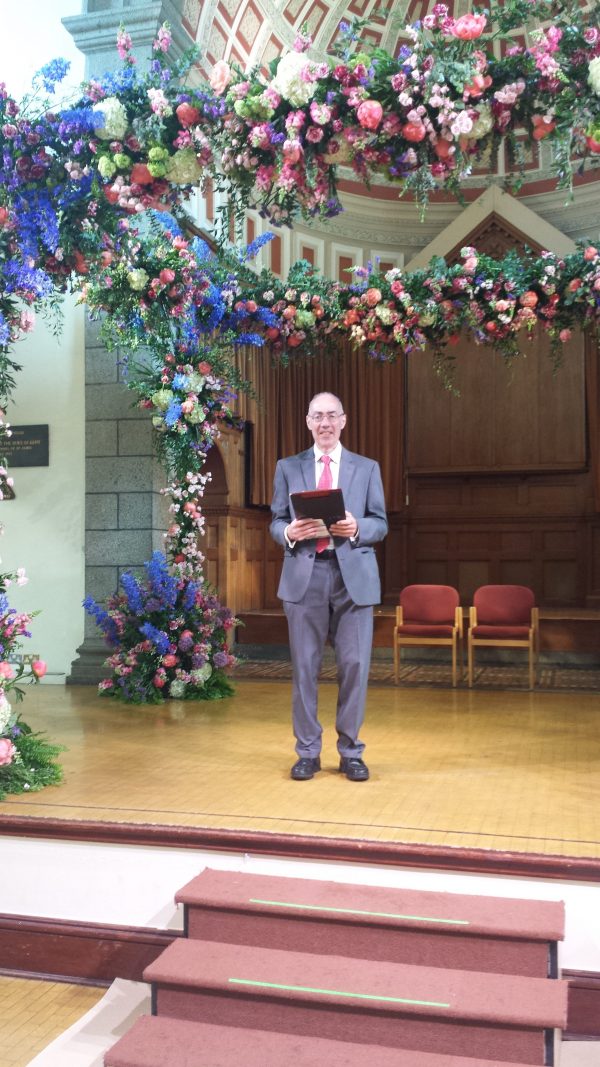
by Michael | Mar 5, 2020 | Blog
A common question I hear is “who can actually conduct a wedding?”. People are understandably confused. Most think that it has to be a priest (or equivalent) or else the registrars. But those are not the only options.
As we’ll find out, there’s also the civil celebrant who can do the job.
Religious
Obviously, if it’s a full religious wedding, you’d expect it to be handled through the church (or institution), and that should be that. However, this applies (and I’m only talking about England & Wales) for a Church of England service – or Quaker or Jewish. Otherwise, although you are welcome to celebrate a Catholic wedding (say), you will still need to make an appointment (with two witnesses) to go to the Register Office and get legally married there. Without the registrars’ participation and the pronouncing of certain words, you would not qualify as legally wed.
Civil
The registrars offer a service that is totally non-religious. The content varies somewhat from district to district, but the fact that services are completely secular is a constant. Unless you are having a C of E service (or Quaker or Jewish), you will need to call upon the registrars.
There is one
element of choice here, though. You can go down (as already stated) to the
Register Office, and it will cost in the region of £100 for the ceremony.
However, provided certain stipulations are met – notably, four solid walls and
a roof – the registrars will come out to the venue of your choice. This will
probably cost around £600, though.
Celebrant
There is
another option, however, which all too few people know about.
- What
if you don’t want a full religious service?
- What
if you do want it, but are prevented from marrying in your church/synagogue
etc. because (Catholic) you are a divorcee or perhaps because yours is a
mixed-faith ceremony?
- What
if you (or even your parents!) want to have just a little religion in your
service?
Well! Provided that you don’t opt for a humanist celebrant, you can enjoy a personalised ceremony with as much religion as you want.
You still
have to get legally married (as before, by the registrars), but you can then
have the ceremony of your dreams, compiled and conducted by a civil celebrant.
It can be in the venue of your dreams, and, to all intents and purposes, be
your actual wedding. It can reflect your
personalities and beliefs, with inspiring spiritual – or even funny – readings,
and contain personalised sections, such as self-written vows.
So don’t go
thinking that your big day doesn’t have to be the way you want it! Because it
can!
Have a chat
with me, and I’ll show you how.

by Michael | May 28, 2019 | Blog
In my experience, demand for mixed-faith weddings is on the rise.
I’m not sure that the
statistics I found are completely up-to-date, but apparently 45% of Americans
have intermarried. That includes 46% of mainline Protestants, 32% of
Evangelical Protestants, 22% of Catholics and 44% of Jews. I imagine the
numbers are similar for the UK.
So it’s a growing
phenomenon. Nonetheless, there are a number of things you have to think
seriously about, if you are planning a mixed-faith (or interfaith) wedding.
Challenges
The prime
sticking-point is likely to be disapproving relatives. They may be opposed to
their offspring “marrying out”. Possibly, out of religious conviction, or else
because it seems to be somehow “wrong”. Or even, “what would people think?”.
You may feel under
pressure because others are paying for all, or much, of the wedding. But do you
have to compromise your beliefs and desires to suit theirs? Can there not be
some give and take?
Opposition is more
understandable if your parents are active, ardent worshippers. That’s not to
say that people who hardly ever set foot in a church/synagogue/mosque etc. themselves
may not have the most entrenched views!
A lot of relatives
will disapprove out of principle (without necessarily seeking to understand
your motives), so no amount of reason is likely to sway them. However, if they
can be persuaded actually to attend your ceremony, then they may well be
(grudgingly!) forced to accept that your wedding really was quite enjoyable,
possibly even meaningful and actually rather special.
As a couple, you will
have to understand the disappointment your intermarriage might cause, and look
for some compromise. One possibility is to invite family members to participate
in the ceremony. For example, the father can still walk the bride down the
‘aisle’, even if the aisle isn’t actually in a religious building.
Perhaps the other
most important point to be considered is eventual children, and there will be
the question of how (religiously) to bring them up. I don’t think there is any
categorical guidance one can really give – it’s a decision you must reach
yourselves, and you must be prepared to confront it sooner rather than later.
Advantages
If you are faced with
having to plan a mixed-faith wedding, it means that you will both have to be
clear where you stand religiously. You can learn about your partner’s customs
and traditions, and this will help you create a meaningful wedding ceremony –
and guide you in your future spiritual life together.
You will be able to work with your celebrant to agree on a service that is in accordance with your beliefs and desires. You can then include customs and traditional rituals from either religion as you choose – a kind of “edited highlights”, maybe?
As a couple, you can
also select readings relevant to you and which underline your mutual love and
willingness to make a commitment to each other. These personalised readings can
lift the occasion far above the mundane. The sincerity and joy of a personalised
ceremony will shine through and contribute to your guests’ delight, as well as
your own.
Compromise
It might be worth
reassuring your parents – if you feel able to –
that any grandchildren will be taught about their religious background
(even if they may not actively practise), that there will be visits at certain
religious holidays, and that parents will be able – and welcome – to play a
part in their grandchildren’s lives.
You can only do so
much, but – whatever the outcome – you’ll be glad you did all you could.
It may take time, but a beautiful mixed-faith wedding may actually bring the families together and pave the way to harmony.
Photo: Philippa Gedge
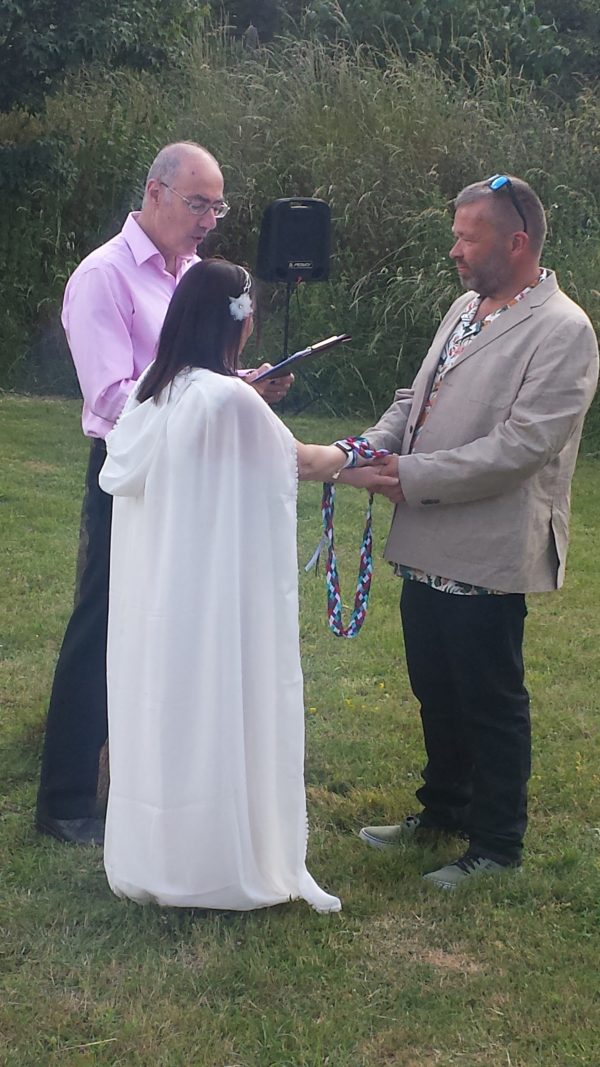
by Michael | Nov 5, 2018 | Blog
Mixed-faith ceremonies were virtually unthinkable a dozen years ago. Fortunately, we’ve moved on. They are much more accepted (and desired) nowadays.
Of course, there is a need. If a couple want to marry religiously, they may be prevented from so doing because of their church’s rules. So a Catholic divorcee will not be able to marry in Church. Same-sex ceremonies are still not accepted by many churches. Mixed-faith couples have the same problem, although some more enlightened institutions may be willing at least to bless the pair.
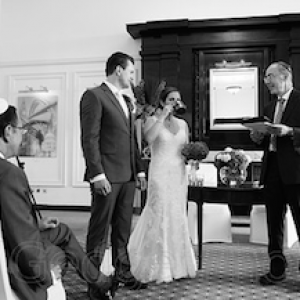 Photo: Philippa Gedge Photography
Photo: Philippa Gedge Photography
Not every mixed-faith couple wants any religion, and the Register Office may fill a gap. (Obviously, all marriages need to be registered officially in this country.) However, Register Office ceremonies are fairly standard and sometimes reek of the conveyor-belt.
An alternative can be a ceremony compiled and led by a civil celebrant (possibly, but not necessarily, a humanist). The celebrant can create a spiritual, beautiful ceremony – but such a ceremony does not have legal validity.
The Registrars’ service will be totally secular. There may be absolutely no religious mentions or readings, which may not meet the needs of the couple (or their families).
A civil celebrant will be able to meet the pair’s needs, if they want a part-religious ceremony. The celebrant may not be ordained, but can still include religious elements (usually agreed with the couple).
In fact, the civil celebrant will work with the couple to design the service that fits in with their beliefs. So it may be religious, part-religious or totally secular. It may contain rituals from a variety of religions and/or cultures.
The service will also be exactly as the couple want. It is up to them what clothes will – or will not – be worn (I have received special requests about my garb – but not, as yet, to wear a football shirt!). The couple can choose readings or poems, and also readers. There can be an address by the celebrant – checked in advance by the couple. They can have elements that they want, including the music, in the order that they want. (The celebrant may well offer advice.) They may choose to deliver their own vows. In short, absolutely everything can be approved by the couple before the day.
Logistically, there are a couple of decisions to be made.
- Should the register office ceremony take place a few hours – or a day or two – in advance? That way, the legal bit is covered by the time the couple come to the ‘real’ wedding ceremony, and they can relax and really enjoy their bespoke ceremony.
- Should the civil ceremony or blessing come straight after the legal marriage (at the same venue)? The ring blessing, for example, could be done by the civil celebrant, as could the vows. This way, the registrars could conduct a 10-15 minute ceremony, and the blessing ceremony could take around as long (depending), but cover the couple’s wishes.
The important thing on such a big day is to deliver a memorable, meaningful ceremony – one which the couple and their guests will remember fondly for months and years to come. By creating a personalised service and conducting it professionally, a good civil celebrant will ensure this.
Please ask Michael for more information.
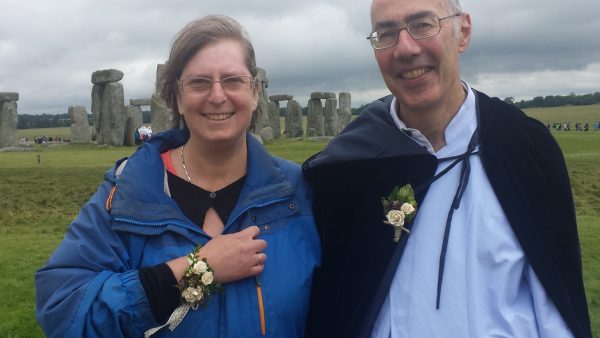
by Michael | Jun 25, 2018 | Blog
The proposal is over and done with. You’re engaged! What an exciting time! Congratulations!
Of course, this is a wonderful period. You’re walking on air. But maybe I can bring you down to earth just a little. There are some questions you need to consider.
Are you going to name the day now? What sort of ceremony will you have? What about the reception? Where will it be? Who will you invite?
And so it goes on …
That’s reality, I’m afraid!
First things first
If you’re opting for a full-religious ceremony, then your church/synagogue/mosque etc. will give you the information you will need.
If you’re not so sure you want to go down this route, then it’s worth reading on. Because you do have choices.
Options
There’s a register office wedding. That covers the legal bits. However, the ceremony is, frankly, not particularly special. The service (apart from the names used) will be the same from one couple to the next. You can feel part of a ‘conveyor-belt’.
Better than this is what a civil celebrant offers. He will create and conduct a tailor-made ceremony for you. You’ll still need to go to the register office with two witnesses to get the legal bits done before the civil ceremony. (This can happen the morning before, or a couple of days before.)
If you prefer, and you’re using a licensed premises, the registrars can be booked. They’ll come along, and, as soon as they have legally married you, you can proceed with the (celebrant-led) ceremony of your choice.
Advantages
One advantage of a civil ceremony is that you can have a service that is as religious – or not – as you want. Or – and this is great for people who are not marrying someone of the same faith – you can have a mixed religious ceremony. So, for example, I’ve been able to marry a Jew and a Christian, a Jewess and a Muslim and even a half-Jew and a pagan. We’ve been able to incorporate elements from both cultures each time, so everyone was happy.
The full-religious and, indeed, the Register Office, ceremonies follow a set pattern. However, with a (bespoke) celebrant-led ceremony, you can set your individual stamp on the proceedings.
Following a chat with your celebrant, who can suggest to you what is possible and guide you, you can work out a ceremony that reflects your personalities and beliefs, and will be everything you want it to be.
That means you have input into, and editorial control over, everything. You decide on the texts/poems/reading, reciting of vows, who actually participates, music, rituals etc. That’s what I mean by “tailor-made”. The ceremony will be unique: unforgettable for you and your guests; relevant and meaningful.
I can gladly give you more information. Just call or e-mail. This can be an excellent starting point for you, now that you’re engaged. Let me help you successfully tread the exhilarating road that leads to marriage.





